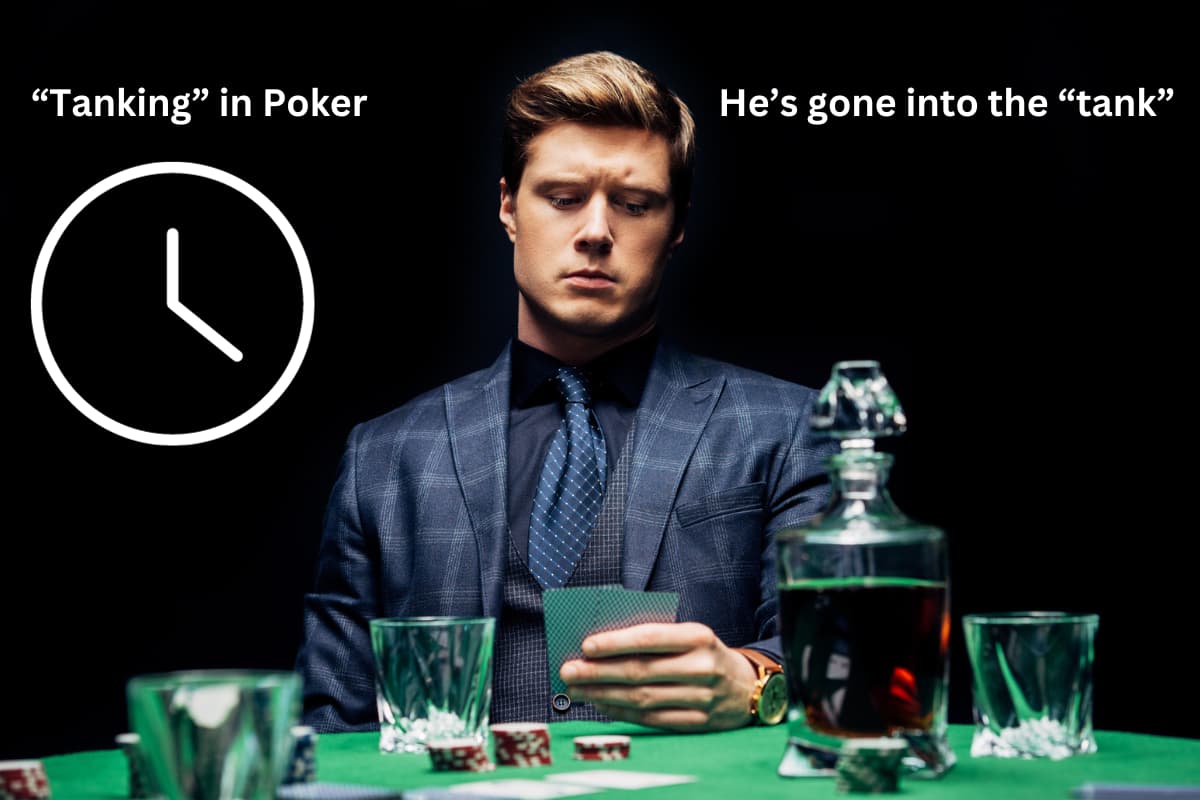I’ve never been one for spending excessively long times over decisions at the poker table. I think you should already be prepared for a bet that comes your way and thinking in advance what you are likely to do. But visit any card-room and you’ll find players going into the tank a common event. That’s why in this article I’m going to explain what tanking is, why players do it and some etiquette around it.
What is the Poker Tank?
In poker, the “tank” refers to the time a player takes to carefully think through a tough decision before acting. Tanking is a vital part of poker strategy, allowing players to thoroughly analyze the odds, outs, pot equity, and opponent tendencies before committing chips. However, excessive tanking can slow down the game and frustrate opponents. Learning proper tanking etiquette is key for any poker player.
The Importance of Tanking
When a player is facing a big decision, such as calling a large river bet or deciding whether to bluff on the turn, taking time in the tank can lead to +EV plays. Counting outs, estimating pot odds, and putting an opponent on a range requires focus whether you’re playing live or at a casino ro. Tanking allows the necessary mental calculations. Players who act too quickly may miss key information and make -EV mistakes.
Example of Going into the Tank
You’re playing a no limit $1-$2 cash game at your local cardroom. You’re sitting with $350. Under the gun opens to $10 you 3-bet to $35 with Qs Qd and he now makes it $100. You choose to call and see the flop. The flop comes 2s 9c 3h. He moves all-in for $220. You’re in a sticky spot, this opponent has played a tight-solid game. You need to run the math and see if there is any way you can make the call so you go into the tank. Eventually you fold as you calculate its too likely he has aces or kings as he is mostly flat-calling his A-Ks to a 3-bet in pre-flop scenario.
Tanking Etiquette
That said, common tanking etiquette applies. First, act in turn. Don’t tank when it’s not your decision. Pay attention to the action so you’re prepared when it’s your turn. Second, be reasonable. Taking a minute or two to tank is fine. Ten minutes is excessive. Players should aim to act in a timely manner. Third, don’t Hollywood. Don’t pretend to be in the tank when you’ve already decided. This slows the game unnecessarily.
Calling the Clock in Live Poker
In live poker, any opponent can “call the clock” on a player tanking too long. A floorperson then comes over. The tanking player is given a short period of time, often just 30-60 seconds, to make their decision. If they fail to act in time, their hand is dead.
Calling the clock speeds up the action. But it also essentially forces the tanking player to make a snap decision without full analysis. So it’s seen by some as angle shooting or poor etiquette itself. Players are advised to politely ask a tanking opponent to “please make action, the game is backing up” before calling the clock. Only call the clock as a last resort on a repeat offender.
Conclusion
Tanking can be an important skill, particularly when you are new to poker and working things out. Just be reasonable, follow etiquette, and don’t abuse the tank. Taking your time in a big spot may lead to better, more +EV decisions, but excessive Hollywood tanking only angers your opponents.
Learn to balance using the poker tank effectively with keeping the game moving at a proper pace. As you improve as a player, tanking should become less frequent as you’ll already be thinking about the next important decision in a hand.




